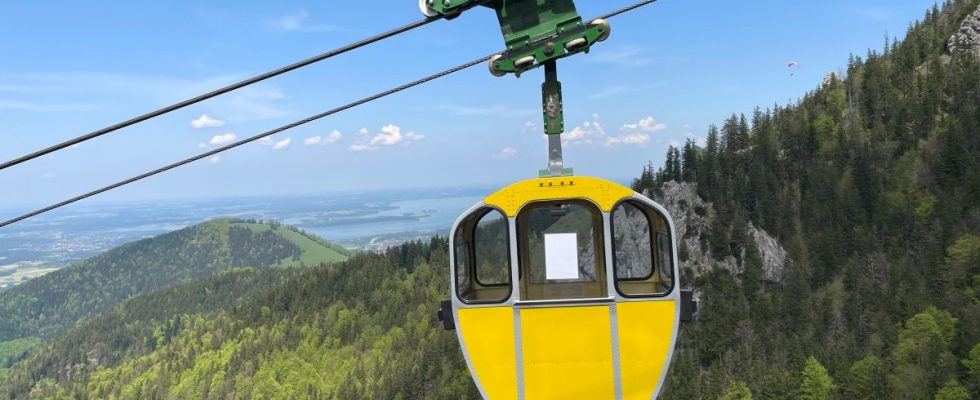At the end of October, the 24th Chamber of the Munich Administrative Court went from Aschau im Chiemgau to the Kampenwand in extremely bad weather. Up there she could have taken a look at those terraces at the Sonnenalm. They had been built without the permission of the Rosenheim district office and were therefore about to be removed. However, the judges’ attention was focused on a project for which there was approval at the time: the new construction of the Kampenwand cable car, which could then have carried three times the number of people up the mountain instead of the previous 450 passengers per hour. With its ruling published on Wednesday, the court has now revoked this approval. What this means in the long term, however, remains to be seen.
First of all, the judges agree with the Federal Nature Conservation Association with their verdict. He had filed a lawsuit against the planned new building, which is intended to replace the now 66-year-old railway, which is characterized by nostalgic charm. From the BN’s point of view, the plants and animals on the already overcrowded Kampenwand cannot tolerate more day trippers, mountain hikers, mountain bikers and paragliders – and especially not late in the evening and at night. The controversial approval from the district office would have allowed the railway operators to make more than 80 late special trips every year for guests of their Sonnenalm.
However, according to the administrative court’s own statement, these concerns are less legally decisive. Above all, the judges consider the district office’s approval to be too “undetermined”. The decision does not make it clear how many and which trees in the protective forest on the mountain slope should and should be felled in order to widen the route as planned and increase the number of cable car supports. It cannot be ruled out that such interventions also affect protected natural forest, which the court is convinced would be inadmissible.
The argument of the district office and the operator that the felling serves to ensure traffic safety and can therefore be permitted does not apply here. The felling would not make any existing traffic route safer, but would rather enable new construction. In the oral hearing in October, the Chamber rejected requests from the BN to have the effects of the project on the local and regional black grouse population assessed by experts as unnecessary in this situation.
It is therefore not a problem for the judges that in addition to the now revoked approval from 2022, there is another from 2017. Because no one has filed a lawsuit against it, it is now valid, even if, according to the chamber chairmen’s explanations during the oral hearing in October, it has serious defects. The district office only approved the new valley and mountain stations according to building law and not according to cable car law. It remains to be seen whether this could render the first approval invalid.
In any case, the on-site appointment in October did not take place in the best weather for excursions.
(Photo: Uwe Lein/dpa)
The operators ultimately did not want to realize their at least 30 million euro project, for which Bavaria’s Economics Minister Hubert Aiwanger (FW) had already promised ten million euros in state subsidies, on the basis of this first decision and their somewhat different plans at the time . You and the Free State authorities as the actual defendant could now submit an application for appeal to the Administrative Court within four weeks. Above all, they could try to legally “cure” the approval, which was rejected by the court for purely formal reasons, by providing the necessary detailed maps and plans. At the request of the railway operator, the public was excluded from the on-site appointment before the hearing in October. Conservationists who were on behalf of the plaintiffs had already expressed their suspicion at the time that the layout of the natural forest area should perhaps be made suitable.
Nevertheless, BN regional managing director Peter Rottner described the administrative court’s ruling on Wednesday as an “important success for our sensitive mountain world”. This means that no new construction on the Kampenwand is possible. “Even with a more clearly defined route, the encroachment on the natural forest will not be reduced,” emphasized Rottner as a precaution. “From our point of view, there cannot be a new approval based on revised application documents.”
From the perspective of the other side, this is very possible. A spokesman for the district office emphasized that the operator could also submit a new application. Cable car managing director Eric Zbil wants to stick to the plans, which the court only objected to on a formal point. “The lack of clarity identified in the new approval can and must now be eliminated,” he said. The wider cable car route was also approved in 2017. Documents from this time can be used to prove that the felling did not affect the “natural forest” anywhere, which the Free State introduced as an additional protection category in December 2020.

